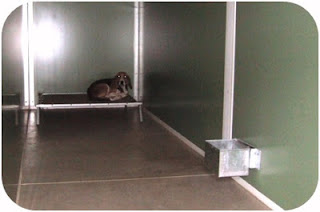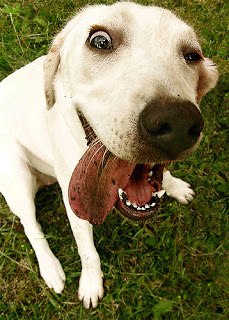Dogs
Oh wow Julie!
It feels a little like I’ve been saying that forever, but technically, it’s not forever (yet). It HAS been several years, but turns out that if you pursue part-time post-grad’ research while juggling full time work, throw in a baby for an extra degree of difficulty (if only they assessed PhD’s like Olympic diving!) and also try to maintain some sort of life (friends are important!), it’s actually quite easy not to get a PhD done in 3 years. It will be a fantastic achievement when I submit it and I have a good feeling that’s not too far away now.
<<<< Know what I mean?
Both social (with people or other dogs/animals) and environmental (physical/sensory) enrichment have been shown to benefit dogs housed in kennel facilities, but no one has looked at the effects of putting these elements together into a structured program. Lots of organisations have implemented enrichment programs in their facilities, but we don’t actually know if it’s benefiting the dogs. It might just be that it makes us people feel better. There’s a chance we might be stressing the dogs by giving them too much to do! This is important, not just to the dogs themselves, but in terms of the work we are wanting them to do.
Mia
© Mia Cobb 2012
- Stereotypical Dogs: Repetitive And Pointless?
"I'm a labrador" does not = "I'm hungry" (source)Hey Julie, it's great to get an updated view of what's on the canine science cards for you in 2014 - looks like we're both going to be keeping busy - and wouldn't have it any other...
- What Music Do Dogs Prefer? Bach Vs. Snoop Dogg
Hey Julie, I hope you've had a fun week. I saw a new in-press publication with your name on it - "Smelling more or less: Investigating the olfactory experience of the domestic dog" - looks like a really great study, and so timely after my last...
- It's All About Objective Multiples...
sciseekclaimtoken-5036b68d5c7f8 First thoughts...Hey Julie! I hope you had a great weekend. Can I tell you more about assessing welfare? Hell to the yeah I can! (By the way, who gave you that photo of me working at 3:17am?!) I could...
- So Much Dog To Talk About. All The Time In The World!
(source)Hi Mia, Yowzer!! We have so much to talk about! Dogs eating poop, welfare assessment, behavioural needs, enrichment and the “guilty look” are only the beginning! Speaking of which, I’m sure you have at least 7,000 more words...
- Back To Basics - Let Me Introduce Myself...
Hey Julie! I'm pretty excited to revisit the whole penpal concept too! I had one when I was 10yrs old who lived in the USA (just like you!) and was named Mia (just like me!). So how about I start by telling you a bit about me? I live...
Dogs
Approval endorsed! Now about that PhD...
Oh wow Julie!
The things crossing your desk are pretty darn exciting, I must say!
Your first peer-reviewed scientific journal publication is totally awesome! It’s a study that I really enjoyed reading about and especially like this video illustration of how owner scolding can influence dog behaviour – poor Denver!
Your first peer-reviewed scientific journal publication is totally awesome! It’s a study that I really enjoyed reading about and especially like this video illustration of how owner scolding can influence dog behaviour – poor Denver!
I look forward to hearing more about the research you’ve done and are currently doing.
What things are you up to at the moment?
“I’m working on my PhD”
 |
| I like these words a lot. They are on my wall. |
So what is it anyway? My research is looking at the effect of an enrichment program on the welfare and performance of working dogs housed in a kennel facility. This came up as something that needed further investigation when I was managing the Training Kennel & Vet Clinic Department at Guide Dogs Victoria.
Most kennel facilities are pretty typical - built to easily maintain hygiene, house lots of dogs safely and securely in a limited amount of space. Because of this, even when facilities are new and kept clean, they are often sterile and unable to meet dogs’ behavioural needs.
 |
| A working dog kennel facility I visited recently - sterile, much? |
Certain behaviours seen in kennelled dogs, such as coprophagia (eating their own or other dogs’ poo – a behaviour not many people openly talk about, but it’s widely seen in kennelled populations), barking, floor licking and excessive self-grooming, have been linked to chronic stress in dogs, helping identify where welfare could be improved.
 |
| Too much of a good thing? |
How do you do that? There are a few pieces to my PhD’s pie. First, I showed that dogs had a physical (stress and immune system) response to entering the kennel facility after leaving their family-home foster environment. Then we placed some dogs into the structured enrichment program and others were kept in the typical kennel manner.
We videoed their behaviour and collected saliva/blood to monitor what was going on inside their bodies that we couldn’t see. Using multiple measures (both behavioural and physiological information) is really important when trying to assess animal welfare. I’ll compare the data from the two groups (enriched and standard kennels) to find out if enrichment made a difference to their welfare.
This study occurred while the dogs were being assessed for entry to guide dog training. So as well as information about how they coped with the kennels and whether the enrichment program helped to improve their welfare, we can also see if there is a relationship between their stress levels and their performance in assessment. I'm VERY interested in this concept of 'Canine Performance Science' in working dogs. I also ran an online survey that over 2,145 people completed about their attitudes and perceptions in regards to working dogs, welfare, kennels, enrichment and training. I am looking at how these opinions vary between general public, kennel staff and dog trainers.
I’m looking forward to my number crunching being finished so I can share my results with everyone! Helping effect change is something I love in my work and it will be satisfying to contribute towards improving the welfare of kennelled dogs who go on to help people with their amazing work.
That’s all from me for now, I look forward to hearing what you’re doing currently,
Mia
- Stereotypical Dogs: Repetitive And Pointless?
"I'm a labrador" does not = "I'm hungry" (source)Hey Julie, it's great to get an updated view of what's on the canine science cards for you in 2014 - looks like we're both going to be keeping busy - and wouldn't have it any other...
- What Music Do Dogs Prefer? Bach Vs. Snoop Dogg
Hey Julie, I hope you've had a fun week. I saw a new in-press publication with your name on it - "Smelling more or less: Investigating the olfactory experience of the domestic dog" - looks like a really great study, and so timely after my last...
- It's All About Objective Multiples...
sciseekclaimtoken-5036b68d5c7f8 First thoughts...Hey Julie! I hope you had a great weekend. Can I tell you more about assessing welfare? Hell to the yeah I can! (By the way, who gave you that photo of me working at 3:17am?!) I could...
- So Much Dog To Talk About. All The Time In The World!
(source)Hi Mia, Yowzer!! We have so much to talk about! Dogs eating poop, welfare assessment, behavioural needs, enrichment and the “guilty look” are only the beginning! Speaking of which, I’m sure you have at least 7,000 more words...
- Back To Basics - Let Me Introduce Myself...
Hey Julie! I'm pretty excited to revisit the whole penpal concept too! I had one when I was 10yrs old who lived in the USA (just like you!) and was named Mia (just like me!). So how about I start by telling you a bit about me? I live...
